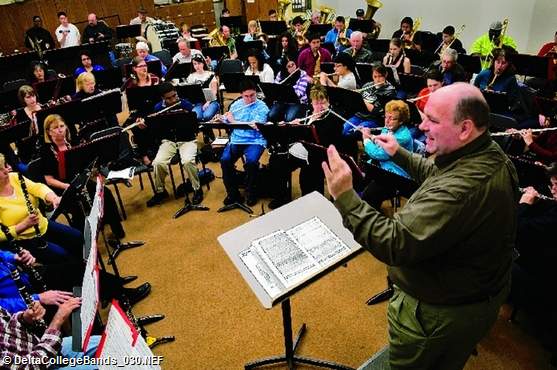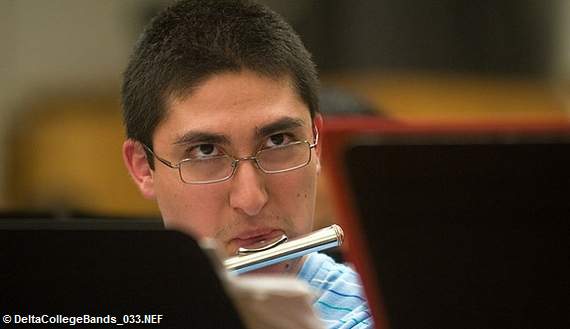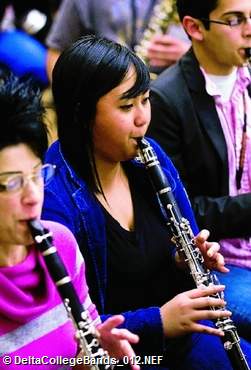120 musicians prepare for a performance at iconic N.Y. hall
By Tony Sauro
Published in the Stockton Record on April 20, 2010

Micaela Rayray played her clarinet at Carnegie Hall when she was 16.
Donald DaGrade is getting his first shot at performing in New York’s musical mecca, though he’s been “scrambling” a little bit. He’s 73.
“You know, there’s that good old joke about a guy walking down the street in New York,” said DaGrade, who plays four instruments and has lived, performed and taught for 40 years in Stockton. “He asks, ‘How do I get to Carnegie Hall?’ Someone answers, ‘Practice, man, practice.’ ”
That’s what DaGrade has been doing in recent weeks, preparing intently for today’s Carnegie Hall performance by the 120-member Delta Winds & Stockton Wind Ensemble — part of a New York International Music Festival organized by Benicia-based World Projects.
The groups — ranging in age from 18 to 80 — were chosen after Art Holton submitted an audition CD. Holton, 60, is San Joaquin Delta College’s director of bands who arranged and organized the performance and five-day trip. The ensemble is performing for 2,000 high school musicians and the public.
“It’s supposed to be a shining example just to be able to be in Carnegie Hall,” Holton said. “It’s amazing for a lot of us, especially Don DaGrade, going for the first time in his life.”
Rayray’s a comparative veteran.
“I was in high school,” Rayray — now a 20-year-old Delta student said of her Carnegie debut with Holton’s groups during the 2007 World Projects Festival. “I didn’t know much about it. But being invited to go to New York and getting to play at Carnegie Hall was unthinkable.
“I knew it was a big deal. During one of our history classes, we learned about Andrew Carnegie. Then I knew, ‘Oh, it is a big deal.’ ”

It’s required a lot of fast work by DaGrade.
“I was scrambling to get the music learned,” said DaGrade, who played his “esoteric” bassoon for 24 years in the Stockton Symphony but switches to his saxophone today in New York.
“Art picked some very challenging pieces, and I put a considerable amount of time into it.”
As he still occasionally does with the symphony, DaGrade — a University of the Pacific professor for 38 years who also plays clarinet, flute and oboe — jumped in as a late substitute when a group member canceled.
Holton’s 12 choices for today’s 84-minute concert range widely — on the stylistic and degree-of-difficulty scales — from compositions by Leonard Bernstein (“Slava! A Concert Overture”) to Stockton’s Max Simoncic.
His “Jazz Concerto” will include solos by Delta College’s Brian Kendrick (vibes) and Sonoma State University’s Aaron Garner (piano).
Holton, who’s been teaching music for 36 years, has played clarinet at Carnegie Hall before. So has his wife, Kathy, who’ll be there again today.
So will Rayray’s cousin Andrea Rayray, 30, a Lincoln High School graduate and Sacramento resident who plays flute and works in banking.
Holton, who’s been at Delta for eight years, was Andrea Rayray’s teacher and also led her in his award-winning Lincoln marching bands.
Holton took Lincoln’s bands to three Rose Parades in Pasadena (1989, 1993, 1999) and the Portland Rose Parade in Oregon, among others. He also played Carnegie Hall with the Stockton Chorale 20 years ago.
Micaela Rayray, who’s glad to be going back but worries about goofing up, enjoys such intertwined relationships.
“I get to play more music with different people,” said Rayray, also a member of Delta’s Wind Ensemble and an unnamed clarinet quartet (with Lodi’s Michael Zuniga, Manteca’s Jolana Garner and Alejandro Lovieria of Los Angeles). “I like playing with professionals around town. A lot of them are teachers. In school, I wanted to get older. So now I can do more things.”
DaGrade has done that for a long time. He and Holton’s late father, Stockton Chorale founder Art Holton Sr., once played saxophone-and-bassoon duets at The Haggin Museum.
Born in Reno, DaGrade lived in Las Vegas during World War II. He got his music education at Brigham Young University and Indiana University, taught at Northeast Louisiana in Monroe and arrived at Pacific in 1970.
DaGrade taught a variety of classes, was an associate dean and then acting dean of the conservatory for a year before retiring in 2008. He played in the now-defunct Sacramento Symphony for seven years and played in the Stockton Symphony.
DaGrade hasn’t slowed down much.
He still teaches bassoon — he owns a 1924 Heckel model he “totally overhauled, refurbished and refinished” — at Delta, gives saxophone lessons, and plays alto sax in Delta’s Monday Night Band and clarinet in “get-together garage bands” such as In the Mood.

Whenever a bassoon is needed — there aren’t many accomplished players, and the best instruments can cost between $30,000 and $40,000 — DaGrade supplies it for the Stockton Symphony and St. John’s Chamber Orchestra.
He plays tennis — “I wish I’d started earlier” — and he and Julie, his wife of 47 years, learned karate together. So, he’s ready for New York. Like Micaela Rayray.
“I just hope I give good performances now that I know more,” she said. “I expect myself to do that. The first time was intimidating, especially when I didn’t know the parts. It was really intimidating.”
“It’s the best acoustic hall there’s ever been,” said Holton. “It’s amazing. (Leonard) Bernstein and (Leopold) Stokowski all were sitting in the same dressing room where we got dressed.”
DaGrade said, “We drove by it once, and they said, ‘That’s Carnegie Hall.’ That’s as close as I ever got.”
Until today.
Comments are closed.